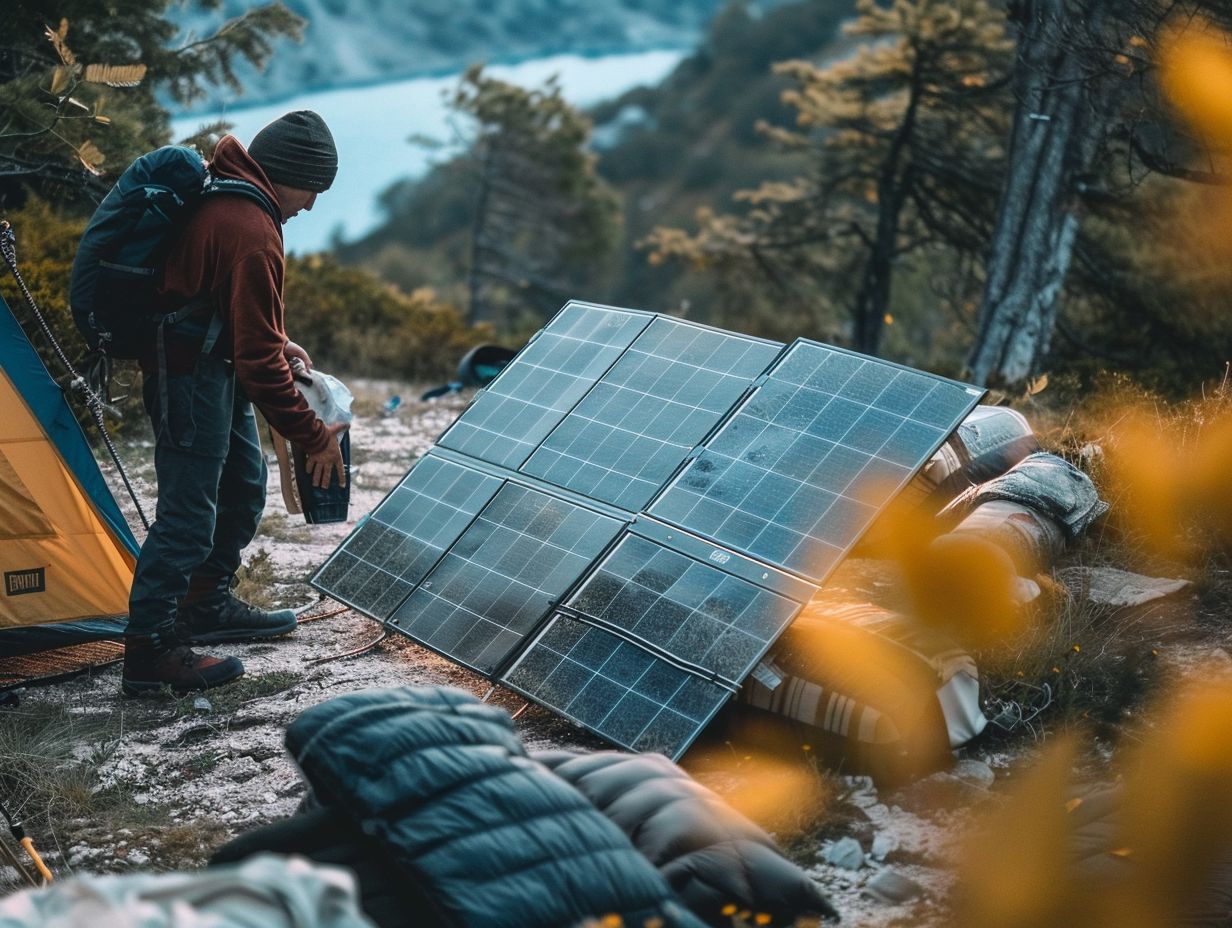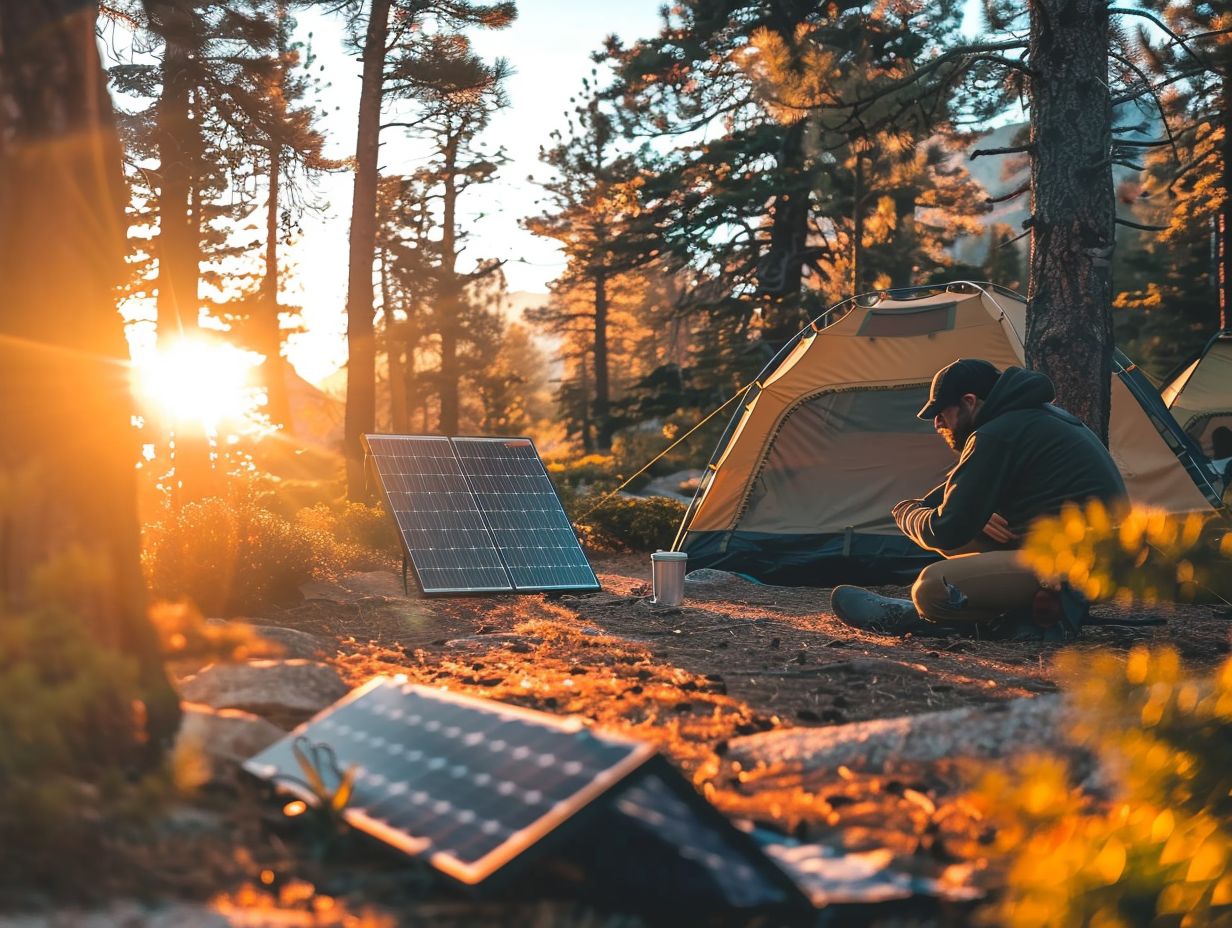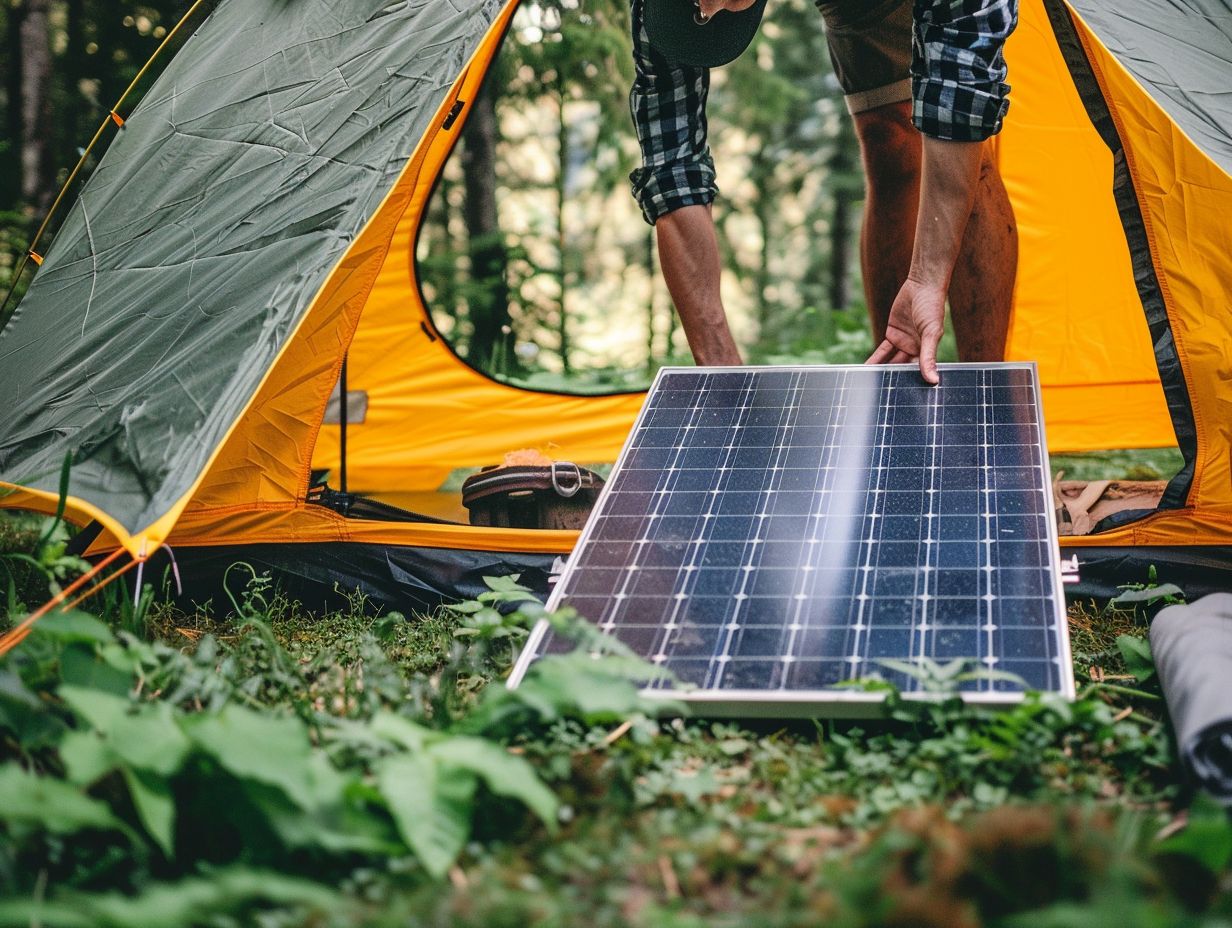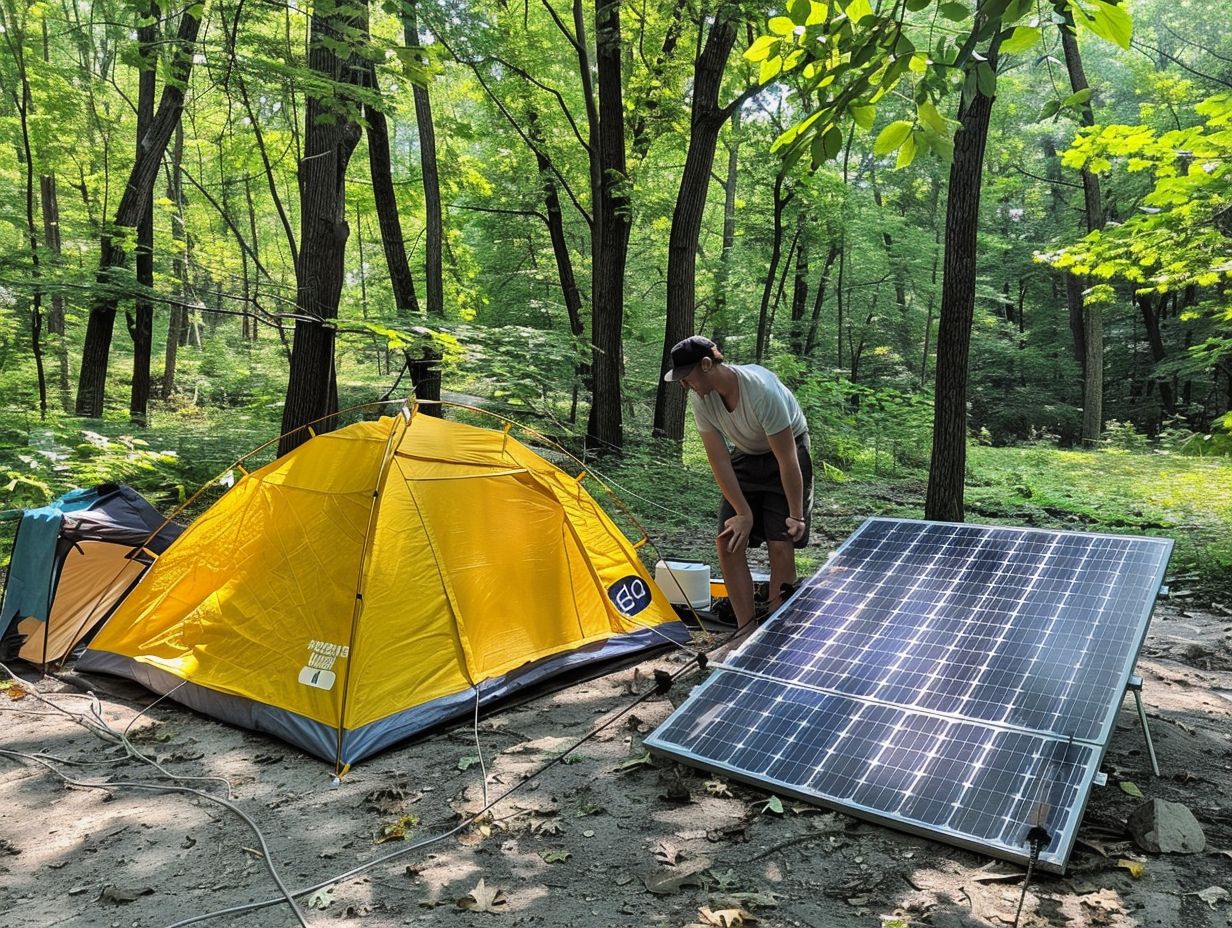Are you tired of lugging around heavy generators or constantly replacing batteries while camping? Delve into the advantages of utilising solar power for your camping excursions. Portable solar panels, solar-powered camping gear, the various types of solar power systems on the market, and how to select the most suitable one for your requirements will all be explored.
Acquaint yourself with the process of setting up your solar power system through a detailed guide and receive recommendations on optimising energy efficiency during your camping trips. Discover essential safety measures to guarantee a secure and pleasurable solar-powered camping experience.
Key Takeaways:
 1.
1.
- Experience the Benefits: Solar power is an eco-friendly, cost-effective and convenient solution for camping. It allows you to stay connected and enjoy your trip without relying on traditional power sources.
- Options for Every Camper: Portable solar panels and solar-powered gear are two popular options for harnessing solar energy while camping. Choose the best option based on your camping needs and budget.
- Consider Key Factors: When selecting a solar power system, consider factors such as power output, size, weight, and compatibility with your camping equipment to ensure the best fit for your needs.
- Easy Set-Up: Setting up a solar power system for camping is simple and can be done in a few easy steps. With proper placement and maintenance, you can enjoy a reliable source of energy throughout your trip.
- Energy Efficiency Tips: To make the most of your solar power system, conserve energy by using low-power devices, charging during peak sunlight hours, and properly managing your battery usage.
- Stay Safe: While solar power is generally safe, it is important to take precautions such as avoiding water exposure and following manufacturer instructions to ensure a safe and enjoyable camping experience.
Why Use Solar Power While Camping
Utilising solar power whilst camping offers you a sustainable and efficient method to utilise sunlight and transform it into electricity to fulfil your power requirements during outdoor excursions.
Portable solar panels have transformed the camping experience by supplying a dependable and environmentally friendly energy source to charge devices and operate appliances.
The environmental advantages of solar power for camping are substantial, as it decreases dependence on conventional fossil fuels, lessens carbon footprint, and helps conserve the pristine natural environment.
The energy efficiency of solar panels ensures that you can produce power even in remote areas where traditional electricity sources are unavailable.
Solar technology is adaptable, allowing you to modify the panel angle to optimise sunlight absorption, making them adaptable for various weather conditions and temperatures encountered during camping trips.
Benefits of Solar Power for Camping
When considering the benefits of using solar power for camping, you will find that it goes beyond just environmental advantages. Along with being eco-friendly, solar power offers campers a reliable energy source that comes from renewable resources. This ensures that you can enjoy power without depleting finite resources.
By utilising advanced lithium batteries, you can rely on efficient energy storage solutions that store excess energy for later use when the sun is not shining. Charge controllers are essential for optimising power flow, preventing overcharging, and maximising battery life. Inverters are also crucial as they convert the direct current generated by solar panels into usable alternating current for powering various devices.
For individuals who require off-grid power, solar grids can be scaled up to meet higher energy demands. This makes solar power a versatile and sustainable solution for powering multiple devices in remote camping locations.
Types of Solar Power Systems for Camping
When considering solar power systems for camping, you have a range of options at your disposal. These include:
- Lightweight and portable solar panels
- Flexible solar panels capable of conforming to different surfaces
- Monocrystalline solar kits recognised for their efficiency and power output
Lightweight solar panels are particularly well-suited for backpackers and hikers who desire a compact and easily transportable energy solution. These panels are meticulously designed to be ultra-portable while still delivering optimal performance.
Conversely, flexible solar panels present a versatile solution for campers with curved surfaces on their vehicles or tents. Their pliable nature enables them to adapt seamlessly to various shapes, offering a convenient method for harnessing solar energy.
For campers in need of a reliable power source with maximum output in a compact form, monocrystalline solar kits, known for their high efficiency, are the ideal choice.
Portable Solar Panels
Portable solar panels are essential companions for any camping trip, providing you with the necessary power to meet your energy needs while off-grid. These solar kits are designed to be compact, lightweight, and efficient, making them ideal for outdoor adventures in remote locations.
Their portability allows you to easily set them up wherever there is sunlight, whether it’s in a forest clearing, by a lake, or on a hiking trail. The efficiency of these solar panels ensures that you can charge your devices and power essential equipment without relying on traditional electricity sources.
With the versatility they offer, you can harness solar energy to keep your devices charged, run small appliances, and even provide lighting for your campsite, all while minimising your carbon footprint.
Solar-Powered Camping Gear

When considering solar-powered camping gear, you are making a sustainable and eco-friendly choice that reduces reliance on traditional power sources. These devices are equipped with features like MPPT chargers, which optimise power generation by tracking the maximum power point for efficient energy conversion.
By utilising this technology, campers can harness the sun’s energy during outdoor adventures to power various gear, including portable solar panels, solar lanterns, and solar-powered chargers. These innovative devices allow campers to charge their electronics on the go, ensuring connectivity while minimising their carbon footprint.
The combination of convenience and environmentally friendly benefits offered by solar-powered camping gear has made it a popular option for outdoor enthusiasts seeking to adopt sustainable practices.
How to Choose the Right Solar Power System
When selecting the right solar power system for your camping needs, you should consider several important factors. Think about the voltage and current requirements of your devices, how long you need the solar power to last, the capacity of the battery storage, and the efficiency of the solar charger in capturing sunlight effectively.
Ensure that the voltage and current output of the solar power system you choose align with the devices you intend to charge. This compatibility is essential for efficient charging and to prevent any damage to your electronics.
The battery capacity is crucial for storing the collected energy, especially for use during the night or in cloudy conditions. Opting for a higher battery capacity will provide you with extended power backup, enhancing the convenience of your camping experience.
Lastly, investing in a reliable solar charger is key. The quality of the solar charger directly impacts how efficiently sunlight is converted into usable energy for your devices.
Factors to Consider
When evaluating solar power systems for camping, you need to consider several key factors to ensure you select the most suitable option for your outdoor adventures. It’s crucial to assess the system’s robustness and durability to withstand the challenging outdoor conditions that camping entails. A sturdy design is essential to ensure the system can endure harsh weather and rough handling.
Along with durability, the technology used for energy storage is a critical consideration. Opting for a system with advanced battery technology can significantly enhance the storage capacity and overall energy utilization of the system, improving its efficiency during your camping trips.
Reliability is paramount when choosing a solar power system for camping. A reliable power supply is essential for various camping activities, such as charging electronic devices or powering lights. By carefully evaluating factors such as robustness, energy storage technology, and reliability, you can select a solar power system that meets your outdoor needs and guarantees a seamless camping experience.
Setting Up Your Solar Power System
When setting up your solar power system for camping, it is essential to follow a step-by-step guide to guarantee proper installation and configuration. Whether you acquire your components from Backcountry.com or other retailers, it is crucial to adhere to relevant regulations such as GDPR in the European Union or specific guidelines in the United States.
To begin, select the appropriate solar panels based on your energy requirements and ensure they are compatible with the charge controller. Position the solar panels in a location that receives maximum sunlight throughout the day. Connect the panels to the charge controller and then to the battery, following the manufacturer’s instructions meticulously.
Following this, connect the inverter to the battery to convert the stored DC power into AC power for your devices. Ahead of embarking on your camping trip, it is advisable to test the system thoroughly to ensure that everything is functioning correctly.
Step-by-Step Guide
- When setting up a solar power system for camping, you need to follow a comprehensive step-by-step guide. The first step involves selecting the appropriate solar charger, as this choice directly impacts the efficiency of your system. It is crucial to find a charger that aligns with the energy requirements of your camping setup.
- Following this, you must ensure the proper configuration of system components such as solar panels, charge controller, and batteries. Understanding the technology behind solar power, including the process by which photovoltaic cells convert sunlight into electricity, is essential for maximising the effectiveness of your system.
- Lastly, optimising energy storage is key. This includes selecting a battery with the right capacity and maintaining it properly to ensure maximum efficiency during camping trips.
By following these steps, you can set up a solar power system that meets your energy needs while enjoying the great outdoors.
Maximising the Use of Solar Power While Camping

To optimise the use of solar power whilst camping, you need to focus on maximising energy output depending on weather conditions and temperature fluctuations. Efficient operation of appliances and strategic electricity management are vital elements in getting the most out of solar power during your outdoor excursions.
Being conscious of the weather patterns in your camping area allows you to anticipate the availability of sunlight for charging your solar panels. Cloudy days or shaded locations can affect solar efficiency, so it is important to adjust the positioning of the panels to capture optimal sunlight.
Considering the impact of temperature on battery performance is crucial; high temperatures can decrease the effectiveness of solar panels. To conserve energy, campers should prioritise essential appliances, utilise energy-efficient devices, and avoid leaving items plugged in unnecessarily to prolong battery life.
Tips for Efficient Energy Use
Efficient energy use whilst camping involves leveraging solar power as a renewable resource, optimising battery performance with lithium technology, monitoring power flow with charge controllers, and converting energy with inverters for seamless operation of devices and appliances.
By utilising the strength of the sun through solar panels, you can ensure a continuous and eco-friendly source of electricity. Lithium batteries offer numerous benefits such as longer lifespan, lighter weight, and higher energy density, making them ideal for storing energy efficiently.
Charge controllers play a crucial role in managing the charging process, protecting batteries from overcharging and optimising power flow. Inverters are essential for converting DC power from the batteries into AC power for running various devices, ensuring a smooth camping experience with all the necessary electronic equipment powered up.
Solar Power Safety Tips
Ensuring safety when using solar power during your camping trips is crucial to fully enjoy the benefits of this environmentally friendly and efficient technology. It is imperative to handle energy storage systems properly and adhere to safety protocols to guarantee a risk-free experience.
One critical aspect of maintaining safety while camping with solar power involves conducting regular inspections of all system components for any indications of wear or damage. This includes checking the integrity of wiring, ensuring proper earthing, and maintaining clean panels for optimal efficiency.
Additionally, campers must be mindful of weather conditions and securely fasten all equipment to prevent accidents.
Adhering to manufacturer instructions for system maintenance and taking necessary precautions during setup and dismantling can significantly reduce the chances of any mishaps.
Precauciones a Tomar al Usar Energía Solar
When using solar power, it is important to take precautions to optimise energy efficiency. Monitor your energy consumption closely to avoid overtaxing your system and risking a sudden power cut. Position your solar panels in direct sunlight and adjust their angle throughout the day to maximise energy production.
Be mindful of temperature fluctuations to maintain optimal performance levels. When operating appliances powered by solar energy during camping trips, follow proper safety guidelines to prevent accidents and ensure a smooth experience.
Frequently Asked Questions
Can I use solar power while camping even in cloudy weather?

Yes, you can still use solar power while camping in cloudy weather. While solar panels are most effective in direct sunlight, they can still produce energy on cloudy days. However, the energy output may be lower compared to sunny days.
How do I choose the right size and type of solar panel for camping?
When choosing a solar panel for camping, consider the size and weight of the panel, as well as the type of camping activities you will be doing. A portable, lightweight panel with a foldable design is ideal for backpacking, while a larger, more powerful panel is better suited for car camping.
How do I set up and install a solar panel for camping?
The setup and installation process will vary depending on the type of solar panel you have. Generally, you will need to find a spot with good sun exposure, unfold or assemble the panel, and connect it to your camping equipment or a battery. Most solar panels also come with instruction manuals for easy setup.
Can I use solar power to charge my electronic devices while camping?
Yes, solar power can be used to charge electronic devices such as phones, laptops, and cameras while camping. You will need a solar panel with a USB port or a solar charger to connect your devices. Keep in mind that charging times may vary depending on the device and the amount of sunlight.
How do I store and maintain my solar panel while camping?
When not in use, it is important to store your solar panel in a dry place to prevent damage. You can also clean the panel with a soft, damp cloth to remove any dirt or debris. If your panel is foldable, make sure to fold it properly to avoid any damage to the wires or connections.
Can I use solar power to cook food while camping?
Yes, solar power can be used to cook food while camping using a solar cooker. These cookers use the sun’s energy to heat up food and are a great eco-friendly alternative to traditional cooking methods. However, they may take longer to cook food compared to gas or charcoal stoves.



